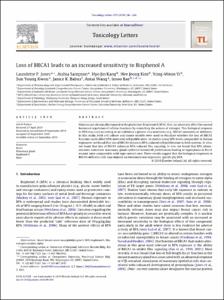Loss of BRCA1 leads to an increased sensitivity to Bisphenol A
- Keimyung Author(s)
- Kwon, Sun Young
- Department
- Dept. of Pathology (병리학)
- Journal Title
- Toxicology Letters
- Issued Date
- 2010
- Volume
- 199
- Issue
- 3
- Keyword
- Brca1; Mammary gland; Bisphenol A; Mice
- Abstract
- Humans are chronically exposed to the plasticizer, Bisphenol A (BPA), that can adversely affect the normal
hormonal regulation of cellular functions by mimicking the actions of estrogen. This biological response
to BPA may vary according to an individual’s genetic characteristics (e.g., BRCA1 mutations or deletion).
In this study, both cell culture and mouse models were used to elucidate whether the loss of BRCA1
function could affect BPA-mediated cell proliferation. In studies using BPA levels comparable to human
exposures,we found that loss of BRCA1 enhances BPA-induced cell proliferation in both systems. In vitro,
we found that loss of BRCA1 enhances BPA-induced ER signaling. In vivo, we found that BPA admin-
istration stimulates mammary gland epithelial tissue/cell proliferation leading to hyperplasia in Brca1
mutant mice compared to wild-type control mice. These results suggest that the biological responses in
BRCA1-deficient cells may depend on environmental exposures, specifically BPA.
© 2010 Elsevier Ireland Ltd. All rights reserved Keywords:
Brca1
Mammary gland
Bisphenol A
Mice
- Keimyung Author(s)(Kor)
- 권선영
- Publisher
- School of Medicine
- Citation
- Laundette P. Jones et al. (2010). Loss of BRCA1 leads to an increased sensitivity to Bisphenol A. Toxicology Letters, 199(3), 261–268. doi: 10.1016/j.toxlet.2010.09.008
- Type
- Article
- ISSN
- 0378-4274
- Appears in Collections:
- 1. School of Medicine (의과대학) > Dept. of Pathology (병리학)
- 파일 목록
-
-
Download
 oak-aaa-4856.pdf
기타 데이터 / 1.74 MB / Adobe PDF
oak-aaa-4856.pdf
기타 데이터 / 1.74 MB / Adobe PDF
-
Items in Repository are protected by copyright, with all rights reserved, unless otherwise indicated.